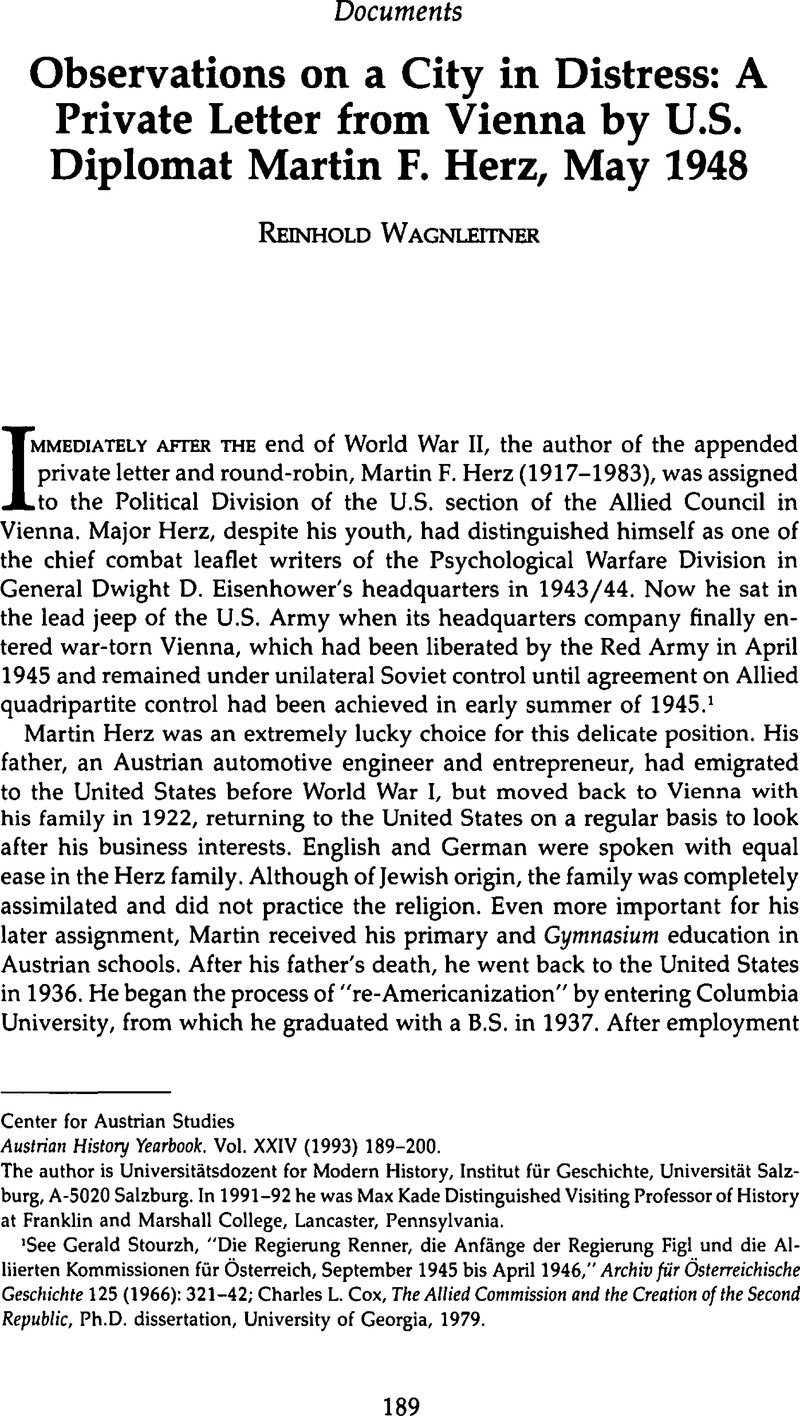No CrossRef data available.
Article contents
Observations on a City in Distress: A Private Letter from Vienna by U.S. Diplomat Martin F. Herz, May 1948
Published online by Cambridge University Press: 10 February 2009
Abstract

- Type
- Documents
- Information
- Copyright
- Copyright © Center for Austrian Studies, University of Minnesota 1993
References
1 See Stourzh, Gerald, “Die Regierung Renner, die Anfänge der Regierung Figl und die Alliierten Kommissionen für Österreich, September 1945 bis April 1946,” Archiv für Österreichische Geschichte 125 (1966): 321–42Google Scholar; Cox, Charles L., The Allied Commission and the Creation of the Second Republic, Ph.D. dissertation, University of Georgia, 1979Google Scholar.
2 Herz's reports on conditions in Austria between August and December 1945 and January 1947 and December 1948 are published in Understanding Austria: The Political Reports and Analyses of Martin F. Herz, Political Officer of the US. Legation in Vienna, 1945–1948 ed. Wagnleitner, Reinhold (Salzburg, 1984)Google Scholar.
3 See Understanding Austria, 21–92.
4 Ibid., 17. This statement is corroborated by the comments and accounts Herz presents in Understanding Austria.
5 For a list of Herz's numerous publications see Understanding Austria, 19. His last book, The Vietnam War in Retrospect, was published posthumously in 1984.
6 See his account 215 Days in the Life of an American Ambassador (Washington, D.C., 1981)Google Scholar.
7 Originally, these private communications were not planned for publication, but shortly before his death Herz talked about the possible publication of theseletters. The originals, which are reprinted here without any changes, are in the private archive of Herz's widow, Dr. Elisabeth Kremanek-Herz, in Washington, D.C. I am grateful for her permission to publish these documents.
8 See footnote 7.
9 The only Communist Minister of the Austrian government, Dr. Karl Altmann, resigned on November 20, 1947, after the Currency Law had passed on November 19, 1947. He was replaced by the Socialist Dr. Alfred Migsch.
10 See Understanding Austria, 288–92.
11 On the cultural policies of the U.S. occupation forces in Austria see Oliver Rathkolb, Politische Propaganda der amerikanischen Besatzungsmacht in Österreich 1945–1949. Ein Beitrag zur Geschichte des Kalten Krieges in der Presse-, Kultur-und Rundfunkpolitik, Ph.D. dissertation, University of Vienna, 1981; Wagnleitner, Reinhold, “Propagating the American Dream: CulturalPolicies as a Means of Integration,” American Studies International, 24, no. 1 (04 1986): 60–84Google Scholar; Wagnleitner, R., “The Irony of American Culture Abroad: Austria and the Cold War,” in Recasting America: Culture and Politics in the Age of Cold War, ed. May, Lary (Chicago and London, 1989), 285–301Google Scholar; Wagnleitner, R., Coca-Colonisation und Kalter Krieg. Die Kulturmission der USA in Österreich nach dem Iweiten Weltkrieg (Vienna, 1991), 207–24Google Scholar.
12 See Hanisch, Ernst, “Historische Überhänge in der Österreichischen politischen Kultur,” Österreichische Zeitschrift für Politikwissenschaft 13, no. 1 (1984): 15–19Google Scholar.
13 Dr. Paul Katscher, Ministerialrat at the Ministry of Transport, was abducted on December 5, 1947. See Understanding Austria, 321, 401–3, 550, 607.
14 On the operation of the Allied Council and the occupation policies in general see Stourzh, Gerald, Geschichte des Staatsvertrages 1945–1955. Österreichs Weg zur Neutralität (Graz, Vienna, Cologne, 1980)Google Scholar; Rauchensteiner, Manfried, Der Sonderfall. Die Besatzungszeit in Österreich 1945 bis 1955 (Graz, Vienna, Cologne, 1979)Google Scholar; Leidenfrost, Josef, Die amerikanische Besatzungsmacht and der Wiederbeginn des politischen Lebens in Österreich 1944–1947, Ph.D. dissertation, University of Vienna, 1986Google Scholar.
15 Gustav Klimt died on February 6, 1918, before the end of World War I, in the influenza epidemic.




